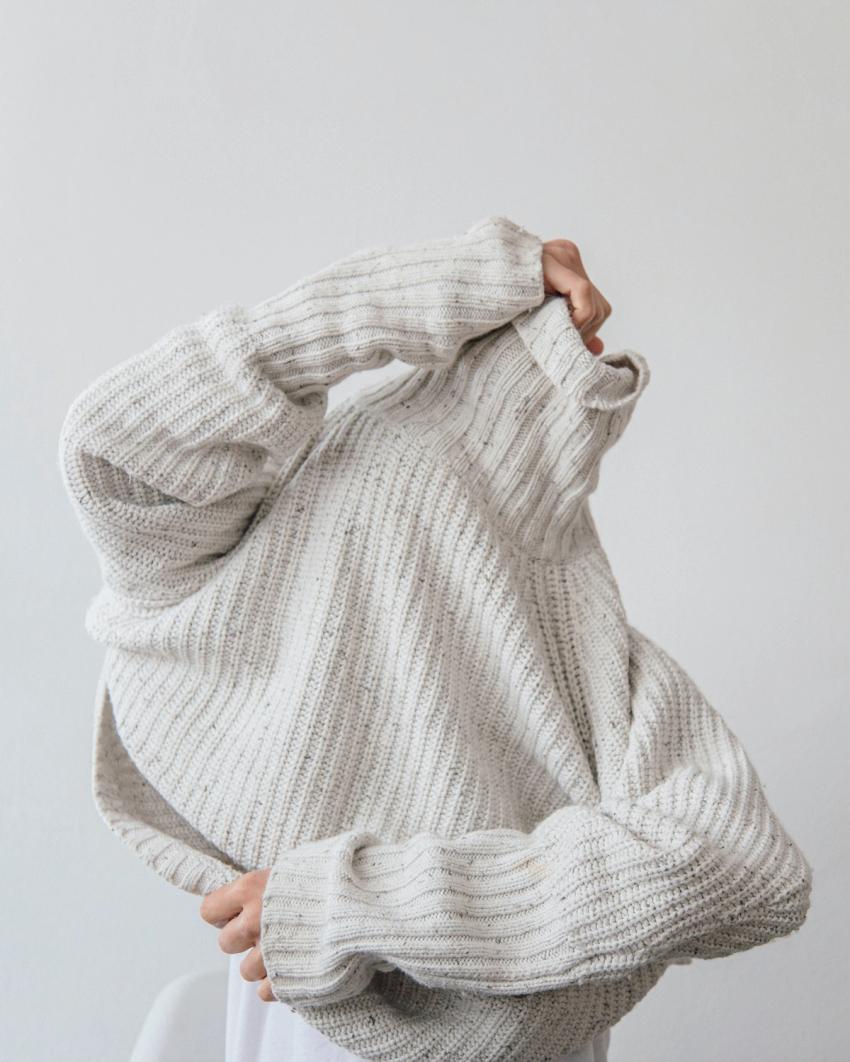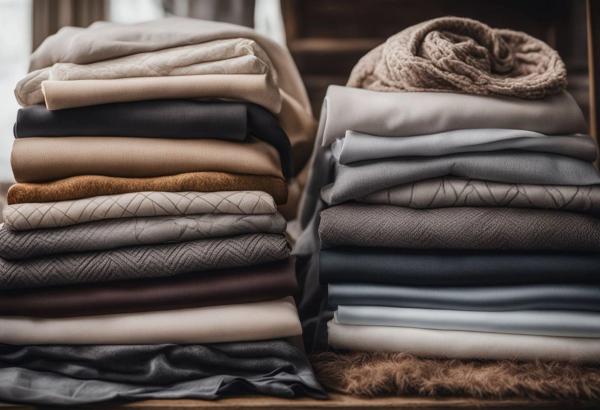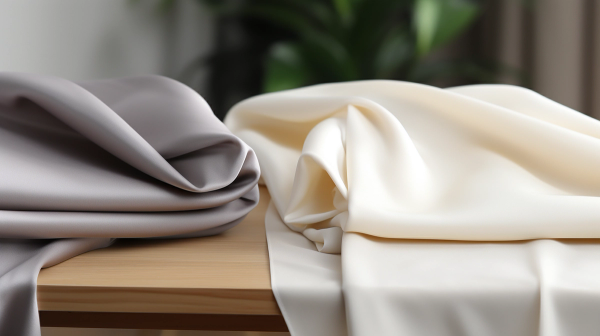Tencel vs. Polyester: Which Fabric Is Best for You?

By Biancha

Tencel vs. Polyester: The Ultimate Fabric Showdown
As we compare Tencel and polyester, we need to consider their production processes, environmental impact, and unique properties. Let's take a closer look at how these two fabrics stack up against each other.
Key Takeaways
- Tencel is a fabric made from the pulp of eucalyptus trees. It's good for your skin and the earth.
- Polyester comes from oil. It lasts long but can harm air, water, and habitats on our planet.
- Tencel feels soft and breathes well. In hot weather or during workouts, it keeps you cool.
- Polyester doesn't wrinkle easily. But in hot weather, it might make your skin feel sweaty.
- Top brands use Tencel because it's eco-friendly and comfortable to wear.
- Brands use polyester because it's cheap, strong, and does not wear out fast.
- When picking a fabric think about its impact on nature, how it feels on your body, how long it's going to last and what price you're ready to pay for all these features combined into one cloth piece.
TLDR: Final Verdict
When it comes to choosing between Tencel and polyester, the better choice is Tencel and with good reason. But the decision ultimately depends on your personal preferences, priorities, and values. Here's an expanded rundown of the main differences between when you might want to opt for Tencel or polyester:
When to Buy Tencel
If sustainability and eco-friendliness are top priorities for you, Tencel is the perfect choice. Its closed-loop production process, use of eucalyptus trees, and biodegradability make it a more environmentally responsible choice.
If comfort and breathability are essential, Tencel's softness and moisture management properties make it an excellent option for clothing, especially in warm climates or for activewear.
If you have sensitive skin or allergies, Tencel's hypoallergenic and antibacterial properties make it a safe and gentle choice for garments that come into direct contact with your skin.
If you're looking to support brands that prioritize sustainability and ethical practices, opting for Tencel is a way to align your purchasing decisions with your values.
If you're interested in versatile and high-performance fabrics, Tencel's wide range of usage, from clothing and activewear to home goods and medical products, makes it an attractive choice.
When to Buy Polyester
If affordability is an important factor, polyester garments are generally more budget-friendly than Tencel.
If durability and wrinkle resistance are priorities, polyester's strength can produce years of use. It’s also pretty low-maintenance which is fine for everyday wear.
If you're looking for a versatile fabric with a wide range of applications, polyester is used in various products, from clothing to car parts.
If you are specifically looking for recycled polyester options, you can contribute to a circular economy and support the recycling of plastic waste.
Tencel vs. Polyester: An Overview
What is Tencel?

Tencel, also known as lyocell, is a revolutionary eco-friendly fabric that has taken the fashion world by storm. Developed in the 1980s, Tencel has since become a sought-after choice in terms of natural materials used for stylish clothing.
Tencel: eco-friendly fabric made from wood pulp
Tencel is a kind of fabric that cares for our planet. It comes from the pulp of eucalyptus trees, which grow fast and don’t need much water or pesticides. Tencel's manufacturing process also uses less energy and water than other fabrics.
It turns the tree pulp into soft fibers without wasting resources. Another good thing about Tencel is that it can break down in soil after its use.
People with skin allergies can wear clothes made from Tencel without worry! If you have sensitive skin and/or want to do something cool for the Earth, choose Tencel as your go-to fabric.
What is Polyester?
Polyester is a synthetic fabric made from petroleum-based materials that has been a staple in the fashion industry since its invention in the early 1940s. Known for its affordability, durability, and versatility, polyester has found its way into various applications, from clothing and beyond.
But with the increasing focus on sustainable fashion, polyester's environmental impact has brought criticism, which is probably why you’re reading this article in the first place.
Polyester: synthetic fabric made from petroleum-based materials
Polyester is a type of fabric that comes from oil. This means it's not natural like cotton or wool. People use machines and chemicals to make it out of petroleum-based materials. The process can harm the earth by causing air and water pollution.
Tencel vs. Polyester: Environmental Impact

In terms of sustainability, Tencel leads with its biodegradable properties and production via a closed-loop process. On the flip side, polyester's environmental footprint is concerning due to its contribution towards pollution, habitat destruction, and climate change.
Tencel: biodegradable, produced through closed-loop process
Tencel is a fresh take on fabric that carries less harm for our Earth by using a process known as closed-loop to create it.
This means there's almost no waste, making it an eco-friendly choice. But one thing really stands out - Tencel breaks down in nature over time. Unlike some other fabrics, it will not leave lasting damage to the planet when thrown away.
Polyester: contributes to pollution, habitat destruction, and climate change
You might have guessed this already, but polyester is bad for the earth. Polyester is a non-renewable resource, which means it doesn’t break down on its own in a landfill or ocean - it takes hundreds of years to go away.
When you dump old polyester clothes, they can stay around for a long time and do more harm to our soil, plants, animals, and cycle back to humans.
The production of polyester is also energy-intensive which means it requires a ton of fossil fuels, which then releases greenhouse gases, contributing to global warming. Many habitats get destroyed because of its contribution to climate change.
Comfort and Breathability
Tencel fabric is renowned for its softness, breathability, and superior moisture management properties, making it a pleasure to wear.
On the other hand, polyester holds strong on durability and wrinkle-resistance but may not offer the same level of comfort in hot or humid conditions because it’s less breathable.
Tencel: soft, breathable, moisture-managing
Tencel stands out for its soft touch. This fabric feels nice on your skin. It lets air move through it, keeping you cool. Tencel also deals with wetness well. It can pull sweat away from your body to dry quickly.
This makes Tencel perfect for hot weather and sports clothes. If you have sensitive skin that gets irritated easily, Tencel is a good pick as it fights germs and doesn’t agitate your skin.
Polyester: durable, wrinkle-resistant
Polyester fabric is strong and long-lasting. It can take many years of use without looking worn out. You will also find that this fabric does not wrinkle easily. This makes it a decent choice for items you use every day, like shirts or pants.
When the weather gets hot, polyester might feel less comfortable than other fabrics. Yet, its strength and the fact that it resists wrinkles make it very popular in fashion and industrial uses.
Different Uses of Tencel vs. Polyester
Tencel fabric shines in warm climates, forming a core component of activewear and ideal for individuals with sensitive skin. On the other hand, polyester's versatility covers a wide range of uses but tends to be less comfortable under hot or humid conditions.
Tencel: suitable for warm climates, activewear, sensitive skin
Tencel is ideal for warm places. It takes in sweat and lets your skin breathe easy. This makes it great for sports clothes too, as it keeps you cool during workouts.
People with tender or allergy-prone skin will find Tencel gentle and safe to wear. It's hypoallergenic and fights off bad bacteria. That means no angry rashes or discomfort when you dress in Tencel!
Polyester: versatile, less comfortable in hot or humid conditions
Polyester has many uses and chances are you’ve used or worn something made from it. You can find it in a lot of products. Even after years of use, polyester keeps its shape well. But when the weather is hot or wet, you might not feel comfortable in polyester clothes.
Brands to Buy Tencel

Here are some top brands from the United States (because we like to support local businesses, first!) that produce Tencel sheets, clothing and other products:
- Patagonia: A pioneer in sustainable outdoor clothing and gear, Patagonia is committed to responsible manufacturing practices and environmental conservation. One popular option is their Capilene® Cool Trail T-Shirt, which blends Tencel fibers with recycled polyester for optimum comfort and moisture management.
- EILEEN FISHER: EILEEN FISHER emphasizes sustainable and ethical fashion. They incorporate Tencel into many of their designs, from dresses and tops to pants and skirts. EILEEN FISHER's Tencel Jersey Scoop Neck Long Dress is a versatile, comfortable, and stylish choice for various occasions.
- Reformation: Known for their sustainable and fashionable women's clothing, Reformation incorporates Tencel into dresses, tops, jumpsuits, and more. The Reformation Winslow Dress, made from Tencel, is a popular choice for its flattering silhouette and sustainable fabric.
- Amour Vert: Amour Vert focuses on ethical practices in the production of their clothing. Amour Vert offers Tencel-based garments, including tops, dresses, and jumpsuits. Their Julianne Tie-Front Dress, made from Tencel and organic cotton, is a chic and sustainable choice.
- Allbirds: While Allbirds is best known for their comfortable and eco-friendly shoes, they also offer a range of clothing made from sustainable materials, including Tencel. Their Trino™ fabric, which combines Tencel with merino wool and recycled polyester, is used in t-shirts, tank tops, and underwear.
- Pact: Pact is dedicated to producing sustainable and affordable clothing and home goods made from organic materials such as cotton sheets, bed linens, pillowcases, and sleepwear. Their Tencel Sheet Set is a popular choice for its softness and sustainability.
Remember, informed consumers can make a difference in the fashion industry by supporting sustainable practices and choosing eco-friendly fabrics. By considering the environmental impact of your purchases, you can contribute to a greener future for our planet.
Pros and Cons of Tencel vs. Polyester
When choosing between Tencel and polyester, you might want to consider various factors, such as sustainability, comfort, durability, and cost difference.
Let's break down the pros and cons of each fabric from a consumer's perspective to help you make the best decision for your wardrobe and the environment.
Tencel
Pros:
- Sustainability: The closed-loop system uses less energy. It’s sourcing of eucalyptus trees and its biodegradability make it an eco-friendly fabric choice.
- Comfort: Soft, breathable, and has excellent moisture management, which is the idea option for a post-Covid world where sweats (stylish, of course) and comfy clothes are our go-to.
- Hypoallergenic: The antibacterial and hypoallergenic properties are great for those with sensitive skin or allergies. Even if you don’t have sensitive skin, using gentle fabrics help your skin breathe better.
- Versatility: Super versatile and used in everything from lyocell clothing and activewear to bed sheets and medical products.
- Aesthetic appeal: Tencel fabrics have a luxurious feel and drape, often enhancing the appearance and feel of garments.
Cons:
- Cost: Can be more expensive than their polyester rival. But good news for Tencel lovers — the price difference has been going down as the demand for this fabric grows.
- Durability: While Tencel is quite durable, it may not be as long-lasting as polyester, particularly in high-stress applications.
Polyester
Pros:
- Affordability: Polyester fabric is more affordable than Tencel, making them accessible to more people.
- Durability: Synthetic fabrics like Polyester are known for their strength and resistance to wear and tear.
- Wrinkle resistance: Less prone to wrinkling than Tencel, making them low-maintenance.
- Versatility: Used in a wide variety of products, from clothing and home textiles to car parts.
Cons:
- Environment: The production process of polyester uses a lot of energy and is a huge problem in pollution. The fabric’s also not biodegradable, which makes it long-term waste.
- Comfort: Polyester isn’t as breathable as Tencel and may feel less comfortable in hot or humid conditions. Aka forever, because…global warming?
- Moisture management: Polyester's moisture-wicking properties can be inferior to Tencel's, making it less suitable for activewear. Aka not great for hitting the gym.
Tencel is the clear winner in terms of sustainability and comfort, but polyester offers affordability and durability. As a conscious consumer, it's essential to weigh these factors based on your priorities and make informed decisions that align with your values and needs.
Striving for a Sustainable Wardrobe and Lifestyle

As we've explored the ins and outs of Tencel and polyester, it's essential to recognize that choosing eco-friendly fabrics is just one part of the equation. To truly embrace a sustainable wardrobe, consider the following steps that can help you reduce your environmental footprint and make a positive impact:
1. Buy Less, Choose Well
One of the most effective ways to achieve a sustainable wardrobe is to buy fewer items and prioritize quality over quantity. Invest in well-made, timeless pieces that will last for years, rather than succumbing to fast fashion trends that contribute to excessive waste and pollution.
2. Support Ethical Brands
Do some research and seek out brands that prioritize sustainability and ethical practices in their production processes, materials sourcing, and labor standards. By supporting these brands, you're voting with your wallet and encouraging the fashion industry to adopt more responsible practices.
3. Care for Your Clothes
Extend the life of your garments by taking proper care of them. Follow the instructions on the care label (finally test out the gentle cycle), use cold water for your washing machine, air dry when possible, and repair damaged items instead of discarding them.
A little extra effort can significantly increase the lifespan of your clothes, reducing waste and saving resources.
4. Recycle, Reuse, and Repurpose
Instead of throwing away unwanted clothing, consider recycling, donating, or repurposing them. Many organizations accept used clothing donations or facilitate textile recycling, while creative upcycling projects can give new life to old garments.
Also try exploring second-hand stores and clothing swaps to find pre-loved items that deserve a second chance.
5. Educate Yourself and Others
Stay informed about sustainable fashion and environmental issues, and share your knowledge with others. Encourage friends and family to make more conscious choices and discuss the importance of sustainable practices in everyday life. By raising awareness and promoting responsible consumer habits, we can collectively make a difference.
By choosing eco-friendly fabrics like Tencel, supporting ethical brands, and embracing sustainable practices, we can create a positive impact on the environment and contribute to a brighter, greener future.
Every step counts, and together, we can make a change—one stitch at a time.
FAQs
1. What is the main difference between Tencel and polyester?
Tencel, also known as lyocell, comes from natural fibers while polyester is a type of synthetic fabric. Both have different options for use in the fashion industry.
2. How are Tencel fibers made?
Tencel fibers come from wood cellulose of trees like birch. They get turned into fiber with a chemical solvent in a process called the closed loop process.
3. Is Tencel or Polyester better for hot sleepers?
Tencel sheets can be a good option for hot sleepers because they let air through small holes on their smooth surface which helps keep you cool.
4. Are Tencel fabrics sustainable?
Yes! Lyocell garments are viewed as sustainable fabrics because they use less water and create less waste during their manufacturing than synthetic materials like polyester.
5. Can I wash my new Tencel sheets in the washing machine?
Yes, but it's best to use cold water and gentle cycle to help your Tencel bed linen last longer.
6. Does Polyester require special care?
Check your care label before washing any types of fabric including polyester shirts - most can go into washing machines but some might need lower temperatures.



